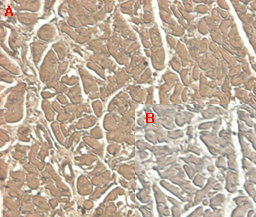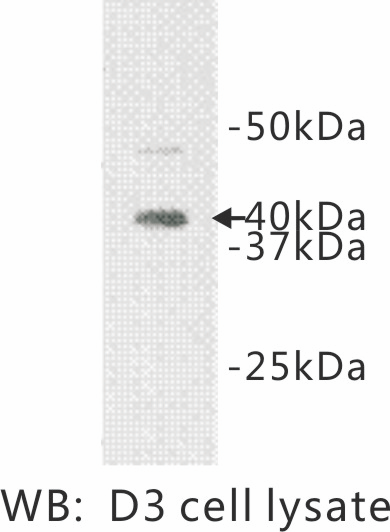
Immunohistochemical staining of human tissue using anti-ST2 (human), mAb (ST33868) (Prod. No. AG-20A-0044) at 1:100 dilution. A. Immunoperoxidase staining (cytoplasmic) of formalin-fixed, paraffin-embedded human heart (100x, brown colour). B.
anti-ST2 (human), mAb (ST33868)
AG-20A-0044
ApplicationsWestern Blot, ELISA, ImmunoHistoChemistry
Product group Antibodies
ReactivityHuman
TargetIL1RL1
Overview
- SupplierAdipoGen Life Sciences
- Product Nameanti-ST2 (human), mAb (ST33868)
- Delivery Days Customer10
- ApplicationsWestern Blot, ELISA, ImmunoHistoChemistry
- CertificationResearch Use Only
- ClonalityMonoclonal
- Clone IDST33868
- Concentration1 mg/ml
- Gene ID9173
- Target nameIL1RL1
- Target descriptioninterleukin 1 receptor like 1
- Target synonymsDER4, FIT-1, IL33R, ST2, ST2L, ST2V, T1, interleukin-1 receptor-like 1, growth stimulation-expressed, homolog of mouse growth stimulation-expressed, interleukin 1 receptor-related protein
- HostMouse
- IsotypeIgG1
- Protein IDQ01638
- Protein NameInterleukin-1 receptor-like 1
- Scientific DescriptionMonoclonal Antibody. Recognizes human ST2. Isotype: Mouse IgG1kappa. Clone: ST33868. Applications: ELISA, IHC, WB. Liquid. 0.2microm-filtered solution in PBS, pH 7.4. Contains no preservatives. The ST2 gene was originally identified as a gene induced by serum or oncogene expression in fibroblasts. The gene produces a shorter soluble secreted form (ST2) and a longer, transmembrane form (ST2L) by alternative splicing. Soluble ST2 has been shown to downregulate the expression of TLR1 and TLR4. ST2L negatively regulates TLR4 signaling and induces endotoxin tolerance, and enhances Th2 responses. IL-33 is the specific ligand for ST2L. - The ST2 gene was originally identified as a gene induced by serum or oncogene expression in fibroblasts. The gene produces a shorter soluble secreted form (ST2) and a longer, transmembrane form (ST2L) by alternative splicing. Soluble ST2 has been shown to downregulate the expression of TLR1 and TLR4. ST2L negatively regulates TLR4 signaling and induces endotoxin tolerance, and enhances Th2 responses. IL-33 is the specific ligand for ST2L.
- ReactivityHuman
- Storage Instruction-20°C,2°C to 8°C
- UNSPSC41116161






